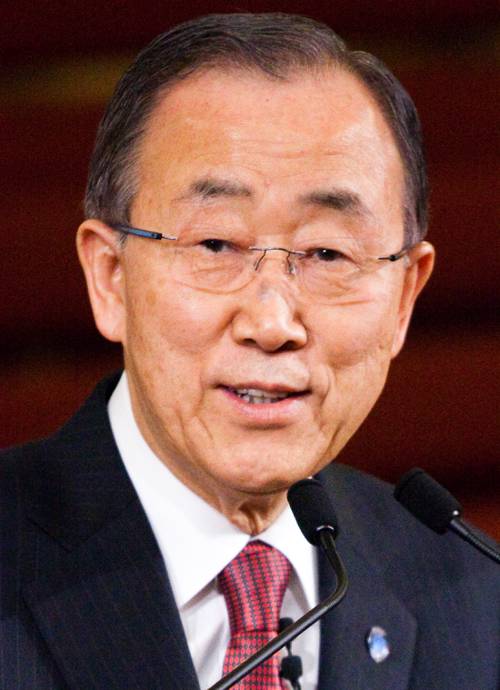
FAQ About Ban Ki-moon

Who is Ban Ki-moon?
Ban Ki-moon is a South Korean diplomat who served as the Secretary-General of the United Nations from January 2007 to December 2016. He is recognized for his efforts in advancing global peace, enhancing sustainable development, and addressing climate change.

What were Ban Ki-moon's main achievements as the UN Secretary-General?
As UN Secretary-General, Ban Ki-moon prioritized climate change, sustainable development, and humanitarian responses. He played a crucial role in facilitating the Paris Agreement on climate change, launching the Sustainable Development Goals (SDGs), and promoting peace in conflict regions.

When did Ban Ki-moon serve as Secretary-General of the United Nations?
Ban Ki-moon served as the Secretary-General of the United Nations from January 1, 2007, to December 31, 2016.

What is Ban Ki-moon's background before becoming the UN Secretary-General?
Before becoming Secretary-General, Ban Ki-moon had an extensive career in South Korea's Ministry of Foreign Affairs and Trade. He also served as South Korea's Ambassador to Austria and as Foreign Minister from 2004 to 2006.

How did Ban Ki-moon contribute to climate change initiatives?
Ban Ki-moon was instrumental in mobilizing global action against climate change. His efforts culminated in the successful adoption of the Paris Agreement in 2015, aiming to limit global warming and promote environmental sustainability.

What are the Sustainable Development Goals that Ban Ki-moon helped implement?
The Sustainable Development Goals (SDGs), launched in 2015, include 17 goals such as eradicating poverty, ensuring quality education, promoting gender equality, and taking urgent action to combat climate change. These goals serve as a blueprint for achieving a better and more sustainable future.

How did Ban Ki-moon address global conflicts during his tenure?
During his tenure, Ban Ki-moon worked towards conflict resolution and peace-building by leveraging UN diplomatic channels and supporting peacekeeping missions. He actively engaged in discussions to resolve conflicts in regions like the Middle East and Africa.

What was Ban Ki-moon's role after leaving the UN?
After his tenure at the UN, Ban Ki-moon continued to advocate for global issues such as climate change and health. He was appointed as the Deputy Chair of The Elders, a group of global leaders working for peace and human rights, and he also co-chairs the Ban Ki-moon Centre for Global Citizens.

Why is Ban Ki-moon considered a significant figure in global humanitarian efforts?
Ban Ki-moon's leadership in addressing natural disasters, conflicts, and chronic humanitarian crises showcased his commitment to humanitarian aid. His initiatives included strengthening UN emergency response capabilities and enhancing international cooperation to aid vulnerable populations.

What initiatives did Ban Ki-moon introduce to combat global poverty?
Ban Ki-moon championed the Sustainable Development Goals, which aim in part to end poverty by addressing its root causes, improving access to education, and advancing economic growth and inclusivity. He promoted international collaboration to achieve these objectives.

How did Ban Ki-moon influence the United Nations' approach to gender equality?
Ban Ki-moon was a strong advocate for gender equality, launching initiatives such as UN Women, the United Nations Entity for Gender Equality and the Empowerment of Women. He promoted the inclusion of women in peace processes and decision-making roles within the UN.

What personal qualities of Ban Ki-moon were highlighted during his leadership?
Ban Ki-moon was often described as a persistent and diplomatic leader, known for his calm demeanor and ability to navigate complex international issues. His commitment to peace and sustainability was reflected in his proactive approach to these global challenges.

What are some criticisms Ban Ki-moon faced during his tenure as UN Secretary-General?
Despite his achievements, Ban Ki-moon faced criticism for his response to certain global crises, such as the conflict in Syria. Some argued that the UN under his leadership could have done more in terms of decisive action and intervention in high-conflict areas.

How did Ban Ki-moon's leadership style affect the UN's global initiatives?
Ban Ki-moon's leadership was characterized by a collaborative approach, striving to build consensus among member states. This style facilitated significant agreements, such as the Paris Agreement, by encouraging dialogue and cooperation among diverse stakeholders.

What international recognition has Ban Ki-moon received for his work?
Ban Ki-moon has received multiple awards and honors for his contributions to global peace and sustainability, including the Seoul Peace Prize and the Order of Friendship from Russia. His efforts have been widely recognized by international organizations and governments.

What challenges did Ban Ki-moon face in implementing the Sustainable Development Goals?
Implementing the Sustainable Development Goals (SDGs) required significant cooperation among countries, financial resources, and overcoming political differences. Ban Ki-moon navigated these challenges by fostering international partnerships and encouraging commitment to the SDGs' objectives.

What is one of Ban Ki-moon's notable quotes on climate change?
Ban Ki-moon is known for his advocacy on climate change, once stating, "There is no Plan B because there is no Planet B." This quote underscores his belief in the urgent need for action to protect the planet for future generations.

How did Ban Ki-moon engage with youth during his time as Secretary-General?
Ban Ki-moon actively engaged with young people through initiatives like the UN Youth Envoy and supported youth-led organizations. He emphasized the importance of empowering youth to participate in decision-making processes that affect their future.

What was Ban Ki-moon's approach to enhancing the UN's effectiveness?
To enhance the UN's effectiveness, Ban Ki-moon worked on reforming organizational processes, improving efficiency, and enhancing global response mechanisms for humanitarian crises. His efforts aimed to make the UN more adaptive and responsive to global challenges.
